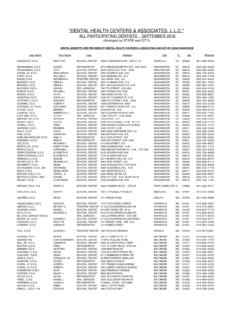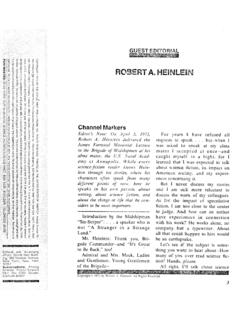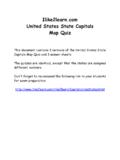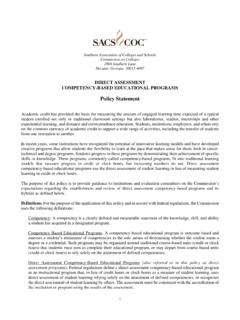Transcription of Unitarian Universalist Church of Annapolis Conflict of ...
1 Board Approved: 07/11/2013 Unitarian Universalist Church of Annapolis Conflict of Interest Policy Article I: Purpose The Unitarian Universalist Church of Annapolis (UUCA) wishes to operate its business within acceptable standards of operation. The purpose of these guidelines is to provide general direction so that these parties can seek further clarification on issues related to the subject of acceptable standards of operation. Article II: Definitions 1. Interested Person This policy is designed for the following parties: a. Ministers; b. Staff (all full-time staff , and any part-time staff who have management responsibilities for hiring, contracting, or purchasing); c.
2 Officers and other Members of the Board of Trustees (collectively called Trustees); d. Members of the Endowment Committee (owing to management of grant money); e. Members of the New Building Committee and Building Repair Committee (owing to material amount of contracting/spending involved in these committees); f. Any other person identified by the Board of Trustees or the Senior Minister (example: someone helping the Senior Minister with an adhoc project that involves contracting or purchasing). Any person from this list who has a direct or indirect financial interest, as defined below, is an interested person. 2. Financial Interest A person has a financial interest if he or she or any member of his/her family has, directly or indirectly, through business, or investment: a.
3 An ownership or investment interest in any entity with which the UUCA has a contract, transaction or arrangement, b. A compensation arrangement with the UUCA or with any entity or individual with which the UUCA has a transaction or arrangement, or c. A potential ownership or investment interest in, or compensation arrangement with, any entity or individual with which the UUCA is negotiating a contract, transaction or arrangement. Compensation includes direct and indirect remuneration as well as gifts or favors that are not insubstantial. Board Approved: 07/11/2013 3. Conflict of Interest An actual or potential Conflict of interest occurs when: a.
4 An interested person is in a position to influence a decision that may result in a personal gain for that person or for a relative as a result of UUCA's business dealings. For the purpose of this policy, a relative is any person who is related by blood or marriage, or whose relationship with the employee is similar to that of persons who are related by blood or marriage. b. In addition, a Conflict of interest exists when an interested person on the Endowment Committee is affiliated with an organization requesting a grant from UUCA. Such affiliation exists if the interested person is a director, trustee, officer, or employee of the organization, or has an unofficial role such as significant donor, volunteer, advocate, or advisor.
5 A financial interest is not necessarily a Conflict of interest. A person who has a financial interest may have a Conflict of interest only if the Board of Trustees decides that a Conflict of interest exists. Article III: Procedures 1. Duty To Disclose In connection with any actual or possible Conflict of interest, an interested person must disclose the existence of the financial interest and be given the opportunity to disclose all material facts related to the proposed contract, transaction or arrangement. a. The Senior Minister or a Trustee should disclose his or her actual or potential Conflict of interest directly to the Board of Trustees.
6 The Secretary of the Board of Trustees will document this information in the meeting notes. b. A Minister or Staff person or other person identified as needing to sign the Conflict of Interest statement (as defined in section ) should disclose his or her actual or potential Conflict of interest to the Senior Minister. The Senior Minister will bring this information before the Board of Trustees for discussion (Step 2 and 3 below) and inclusion in the meeting minutes. c. A member of the Endowment Committee, New Building Committee, or Building Repair Committee should disclose his or her actual or potential Conflict of interest to the Chair of that Committee.
7 The Chair of that committee should document this fact and send the documentation to the Senior Minister. The Senior Minister will bring this information before the Board of Trustees for discussion (Step 2 and 3 below) and inclusion in the meeting minutes. Example 1: A member of the Endowment Committee is a personal friend of someone requesting a grant. She discloses this fact at the Endowment Committee meeting where grants are being discussed and voted on, and excuses herself from the voting. The Chair notes this fact in the summary of the grant allocations to the Board of Trustees. Example 2: A member of the New Building Committee discloses that his brother-in-law is one of the bidders on a proposal.
8 The Chair reports this to the Senior Minister and waits for direction on how to proceed. Board Approved: 07/11/2013 The end result is that all potential conflicts of interest end up being brought to the Board of Trustees, whether by a Trustee or the Senior Minister. 2. Determining Whether a Conflict of Interest Exists After disclosure of the financial interest and all material facts, and after any discussion with the interested person, if the interested person is in the room, he or she shall leave the Board of Trustees meeting while the determination of a Conflict of interest is discussed and voted upon. The remaining Board members shall decide if a Conflict of interest exists.
9 3. Procedures for Addressing the Conflict of Interest a. An interested person may make a presentation at the Board of Trustees meeting, but after the presentation, he or she shall leave the meeting during the discussion of, and the vote on, the transaction or arrangement involving the possible Conflict of interest. b. The President of the Board of Trustees shall, if appropriate, appoint a disinterested person or committee to investigate alternatives to the proposed transaction or arrangement. c. After exercising due diligence, the Board of Trustees shall determine whether the UUCA can obtain with reasonable efforts a substantially similar transaction or arrangement from a person or entity that would not give rise to a Conflict of interest.
10 D. If a substantially similar transaction or arrangement is not reasonably possible under circumstances not producing a Conflict of interest, the Board of Trustees shall determine by a majority vote of the disinterested Trustees whether the transaction or arrangement is in the UUCA s best interest, for its own benefit, and whether it is fair and reasonable. In conformity with the above determination, it shall make its decision as to whether to enter into the transaction or arrangement. 4. Violations of the Conflict -of-Interest Policy For Trustees a. If the Board of Trustees has reasonable cause to believe a member has failed to disclose actual or possible conflicts of interest, it shall inform the member of the basis for such belief and afford the member an opportunity to explain the alleged failure to disclose.







